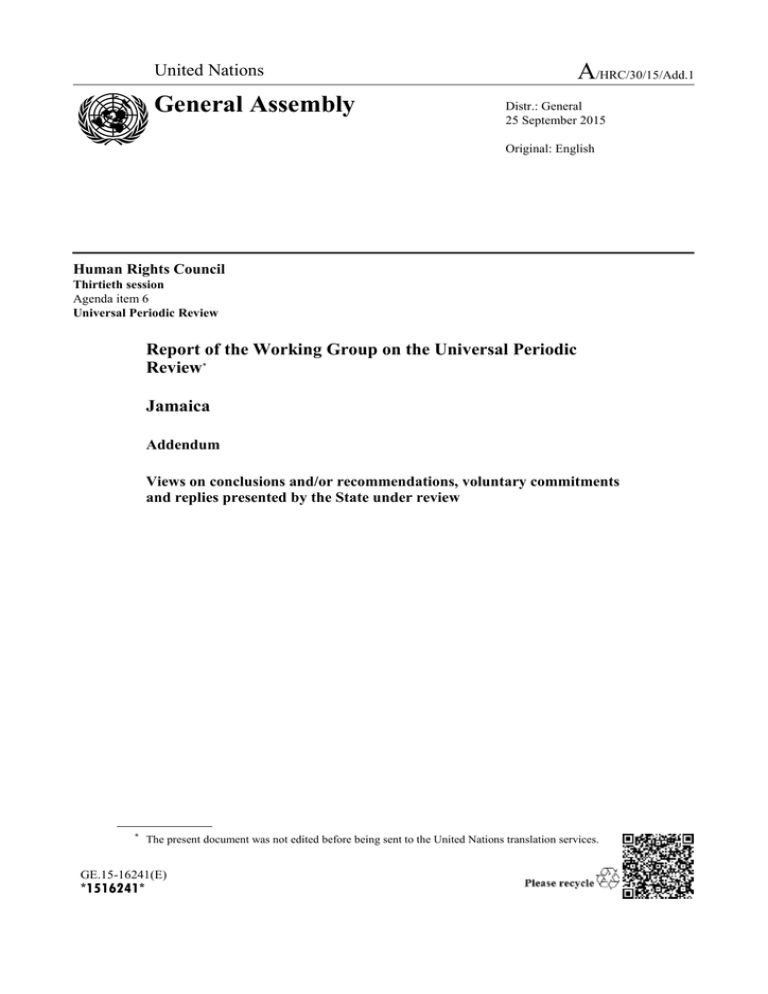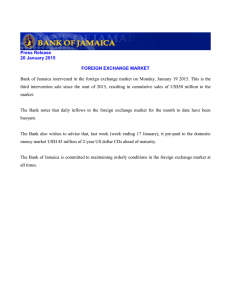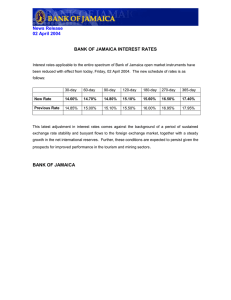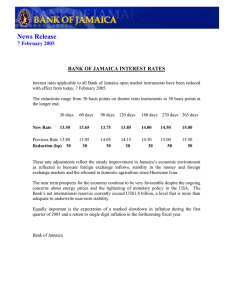
A/HRC/30/15/Add.1
United Nations
General Assembly
Distr.: General
25 September 2015
Original: English
Human Rights Council
Thirtieth session
Agenda item 6
Universal Periodic Review
Report of the Working Group on the Universal Periodic
Review*
Jamaica
Addendum
Views on conclusions and/or recommendations, voluntary commitments
and replies presented by the State under review
*
The present document was not edited before being sent to the United Nations translation services.
GE.15-16241(E)
*1516241*
A/HRC/30/15/Add.1
1.
On 13th May, 2015, Jamaica presented its second cycle report to the 22 nd Session of
the Working Group on the Universal Periodic Review (UPR). During the interactive
dialogue, 168 recommendations were made (as reflected in document A/HRC/30/15). The
majority of these recommendations were accepted by the Government of Jamaica,
including some which the Government regarded as having been already implemented or in
the process of being implemented. Many of these recommendations were overlapping and,
therefore, related responses are repeated as and when necessary.
2.
The following represents Jamaica’s final response to the 168 recommendations
received, including those that the Government had declared would have required further
consideration before the formal adoption of the UPR report by the 30th Session of the
Human Rights Council. Jamaica has accepted 92 recommendations in whole and 2
recommendations in part, including 67 that the Government considers as having already
been implemented or as being in the process of implementation.
I. Scope of international obligations
3.
Jamaica accepts recommendations 118.1, 120.16 and 120.17.
4.
Jamaica accepts recommendations 119.1, 119.2, 119.3, 120.9, 120.14 and 120.15,
which are in the process of being implemented.
5.
Jamaica notes:
• Recommendation 120.18. As stated previously, Jamaica is in the process of
ratifying the Rome Statute of the ICC keeping with our normal practice of
honouring commitments to international treaties, Jamaica intends to implement the
Treaty in line with the commitments in the Statute. In the case of the ICC, however,
this undertaking does not require the Government to enact legislation to incorporate
the entire Treaty into domestic law;
• Recommendations 121.13, 121.14 and 121.15. In keeping with standard practice
and obligations under the Vienna Convention on the Law of Treaties, the
Government is in the process of putting in place, the relevant domestic measures
that can give effect to the implementation of the Optional Protocol to the
Convention on the Elimination of All Forms of Discrimination against Women.
6.
Jamaica does not accept:
• Recommendations 120.1 to 120.5, the first half of recommendation 120.6,
recommendations 120.7, 120.8, 120.10 to 120.12, 121.12, 121.16, 121.17 and
121.18. Jamaica is still in the process of putting in place the relevant domestic
legislation that can give effect to the implementation of the Convention against
Torture and Other Cruel, Inhuman or Degrading Treatment or Punishment. Acts
of torture have never been condoned or accepted as a practice in Jamaica; as has
been reflected in relevant treaty body reports, the Constitution and laws of Jamaica
have always prohibited practices that would be tantamount to acts of torture.
Furthermore, significant progress is being made in addressing many of the
recommendations made by the Special Rapporteur on Torture in his report of the
visit to Jamaica in 2012, regarding, among other things, conditions in places of
detention;
• The second half of recommendation 120.6. Corporal punishment has been
abolished in early childhood institutions, children’s homes and other arranged
alternate living spaces such as Foster Care. Appropriate measures are being taken
2
A/HRC/30/15/Add.1
to ensure that the use of corporal punishment is discontinued in Jamaican schools.
The Child Care and Protection Act affords protection for all children from abuse;
• Recommendations 120.13, 120.19, 121.1 to 121.11 and 121.19.
II. Institutional and human rights infrastructure and policy
measures
7.
Jamaica accepts:
• Recommendations 118.2 to 118.8.
8.
Jamaica accepts as having already been implemented:
• Recommendations 119.5 and 119.6;
9.
Jamaica accepts as being in the process of implementation:
• Recommendations 119.4, 119.7 to 119.14;
10.
Jamaica does not accept:
• Recommendation 121.20; as there is no basis for stating that human rights defenders
are at risk in Jamaica. Full protection is afforded to them as citizens under the law.
They are extremely active, openly and boldly engaged in advocacy, and have
contributed positively to the development of the Jamaican human rights
architecture.
III. Cooperation with human rights mechanisms
11.
Jamaica accepts recommendation 119.15, which is in the process of being
implemented.
IV. Cooperation with treaty bodies
12.
Jamaica accepts recommendation 119.16, which is in the process of being
implemented.
V. Cooperation with special procedures
13.
Jamaica does not accept recommendations 121.21, 121.22 and 121.23; as although
the Government is not opposed to accommodating visits of Special Rapporteurs; these are
considered on a case-by-case basis. It is critically important that the Government should be
given adequate notice to ensure that necessary arrangements are in place for successful
visits, in accordance with mutually-agreed timelines.
14.
Jamaica recommends to the Human Rights Council that a mechanism be put in place
that allows for sharing of information among the various Human Rights bodies and
procedures, as often there are overlapping requests which are inefficient and unduly stretch
the limited resources of the Jamaican State.
VI. Equality and non-discrimination
15.
Jamaica accepts:
3
A/HRC/30/15/Add.1
• Recommendations 118.9, 118.10 and 118.11.
16.
Jamaica accepts, as having already been implemented or as being in the process of
implementation:
• Recommendations 119.17, 119.20 and 119.21;
• Recommendations 119.18, 119.19 and the first part of 120.20 regarding
discrimination against women and children. The Government of Jamaica condemns
all forms of discrimination and negative stereotypes affecting women and children,
and is pursuing appropriate policies to eliminate same. A gender equality
framework is currently in place for the Government’s policies, programmes, and
plans, in keeping with the international legal requirements, international human
rights obligations, commitments, and principles. In this context the Government of
Jamaica is undertaking the following measures:
• acceleration of legal and constitutional reform to protect against sex
discrimination; sexual harassment;
• legal reform the review and amend legislation geared towards greater legal
protection for women and girls;
• ongoing legislative reform relating to women to ensure that women receive
adequate redress under the law; and
• the introduction of new legislation to provide protection and remedies for
women and girls.
17.
Jamaica is a State Party to the Convention on the Rights of Persons with Disabilities
(2007); Convention on the Elimination of All Forms of Discrimination (CEDAW, 1984);
Convention on the Rights of the Child (1991); Inter-American Convention on the
Prevention, Punishment, and Eradication of Violence against Women - Belem do Para
Convention (1994), and fully supports the Beijing Platform for Action (BPFA, 1995);
Millennium Development Goals (MDGs, 2000); and agreed Outcome Documents of
international and regional meetings on gender equality.
18.
Details of some relevant domestic legislation are outlined below:
(a)
The Charter of Fundamental Rights and Freedoms 2011
• Explicitly prohibits gender discrimination. Section 13 (3) (i) (i) provides for
the right to freedom from discrimination on the grounds of being male or
female.
(b)
The Sexual Offences Act, 2011
• Repeals the Incest (Punishment) Act and Sections 44-67 of the (OAPA)
which deal with offences against females;
• Strengthening and defining the offence of rape;
• Creates other sexual offences such as grievous sexual assault and marital
rape;
• Defines a child as a person under the age of eighteen (18) years of age;
• Provides for the establishment of a Sex Offender Registry to house a database
among other matters.
(c)
The Child Care and Protection Act, 2004
• Covers issues affecting children directly as victims, or indirectly (or
potentially) as children in need of care and protection;
4
A/HRC/30/15/Add.1
• Addresses cases of child abuse;
• Makes provision for mandatory reporting;
• Creation of a Children’s Advocate and the establishment of a Children’s
Registry.
(d)
The Domestic Violence Act, 1995 (Amendment) 2004
• Provides for enhanced protection for victims of domestic violence and abuse;
• Applies to both spouses and de facto (common law) spouses;
• Makes provision for persons in visiting relationships;
• Allows for Occupation and Ancillary Orders, giving the victim exclusive use
of a home, furnishings and personal effects;
• Allows Courts to issue Protection Orders, keeping the accused away from the
home, work or school of the victim;
• Protection Orders can be made on behalf of men, women or children affected
by violence within the home.
(e)
The Offences against the Person Act, 2010
• Primary source of sexual offence prohibitions and penalties in Jamaican law;
• Highly gender-specific approach to sexual offences;
• Includes a range of offences related to issues of sexual morality and the
exploitation or defilement of women or children, e.g. procuring a girl to be
engaged in prostitution, other unlawful sexual activities or coerced sex, living
on the proceeds of prostitution, soliciting for immoral purposes, causing a
child to live in a brothel, having sexual intercourse with a woman who is
overpowered by a drug or with a mentally disabled female.
(f)
The National Disabilities Act, 2014
• Promotes full and equal enjoyment by persons with disabilities, of privileges,
interests, benefits and treatment, on equal basis as others;
• Establishes the Jamaica Council for Persons with Disabilities;
• Addresses employment of persons with disabilities and includes nondiscrimination provisions and an obligation on the employer to make
adjustments to the workplace to ensure that the employee is not at a
disadvantage;
19.
Jamaica accepts, as having already been implemented or as being in the process of
implementation:
• Recommendation 120.21. Pursuant to the Legal Aid Act, legal aid is available to
both men and women and access to legal services is provided through the Legal Aid
Council. Legal aid is offered to persons facing criminal charges, not to victims.
20.
Legal aid services in non-criminal matters, such as to assist in family court
proceedings, are primarily provided by the legal aid clinics in Kingston and Montego Bay
as well as the Norman Manley Law School at the University of the West Indies in
Kingston.
21.
A number of other civil society organizations that operate independently provide
legal advice and legal aid in civil and criminal matters, including those related to sexual and
gender-based violence.
5
A/HRC/30/15/Add.1
22.
Woman Inc. is one of the leading women’s NGOs in Jamaica and the only
organisation that specifically provides legal aid services to women who use its services.
23.
Legal pro bono services are offered by some NGOs, such as the Independent
Jamaican Council for Human Rights and private attorneys.
24.
Jamaica notes:
• The second half of recommendation 120.20. The Constitution and laws of Jamaica
have always prohibited practices that would be tantamount to acts of torture, which
have never been condoned or accepted as a practice in Jamaica. Furthermore,
significant progress is being made in addressing many of the recommendations
made by the Special Rapporteur on Torture in his report of the visit to Jamaica in
2012, regarding, inter alia, conditions in places of detention;
• Recommendations 121.25 and 121.26. Jamaica accepts these recommendations in
principle, but considers that the existing, anti-discrimination legislation, other
measures and legislative amendments are collectively adequate and effective to
combat discrimination against women.
25.
Jamaica does not accept:
• Recommendations 121.24 and 121.27 to 121.41. Jamaica has an agglomeration of
legislation, policies, strategies and measures in place at various levels which derive
from the Constitution and which, collectively, form an effective machinery that
provides all Jamaicans redress from discrimination of any kind; it is unnecessary to
create a single anti-discrimination law. It is not accurate to typify the attitudes of
Jamaican society generally as “homophobic prejudices”. Jamaica is committed to
taking steps to end prejudice and stigmatisation affecting all Jamaicans, including
LGBTI persons, emphasising mutual respect among all Jamaicans, adherence to the
rule of law and continuing in a strong historical tradition of freedom of expression.
The Government of Jamaica has consistently condemned all acts of violence,
against all persons. As part of its approach to the decades-old problem of violence
that has spared no community, or group of persons; the Government has been a
leading voice in the Caribbean region, advocating for a regional, hemispheric and
global response to the epidemic of violent behaviour that has affected Jamaica and
other countries in the Americas. Jamaica is confident that the nation will build on
recent modest successes in arresting violent behaviour among State actors and
citizens alike, in order to reduce this trend in the society and among future
generations.
VII. Right to life, liberty and security of the person
26.
Jamaica accepts:
• Recommendations 118.12 to 118.23 and the first half of recommendation 120.22
relating to the implementation of the National Strategic Plan to Eliminate Genderbased Violence.
27.
Jamaica accepts, as having already been implemented:
• Recommendations 119.38, 119.46, 119.47, 119.52, 119.53, 119.54 and 119.55.
28.
Jamaica accepts, as being in the process of implementation:
• Recommendations 119.22 to 119.37, 119.39 to 119.45, 119.48 to 119.51, 119.56,
119.57 to 119.62;
6
A/HRC/30/15/Add.1
• Recommendation 120.24. Street children are properly classified by the Child Care
and Protection Act as being in need of care and protection. Where these situations
are identified, the agencies of the State collaborate to investigate, intervene and
integrate children with their families. Depending on the circumstances, a series of
programmes offered under Jamaica’s social protection system are matched with
individual needs and applied accordingly. Where re-integration is not possible or
other vulnerabilities are identified, the matter is brought to the attention of the
Courts and the child placed in the care of the State.
Several ongoing initiatives, involving multiple agencies and bilateral and
multilateral partners, provide services to street children and data-collection for
Government agencies to strengthen the response framework.
29.
Jamaica notes:
• Recommendation 121.52. As stated previously, no country can guarantee that
gender-based violence will be reported; however Jamaica continues to employ
measures to encourage reporting;
• Recommendation 121.55. Jamaica accepts this recommendation in principle, but
emphasises that these measures have already been implemented, many of which
were detailed in Jamaica’s national report that was submitted to the UPR Working
Group (A/HRC/WG.6/22/1). Our interpretation of ‘sex trafficking’ in the context of
this recommendation is, human trafficking of minors for the purpose of sexual
exploitation;
• Recommendation 121.56. As stated previously, Jamaica has measures in place to
combat discrimination of persons, including those living with HIV/AIDS. All
citizens have equal access to HIV/AIDS medicines.
30.
Jamaica does not accept:
• The second half of recommendation 120.22 relating to the decriminalisation of
abortion. In Jamaica, abortion is permissible on medical grounds;
• Recommendation 120.23. The Sexual Offences Act as it currently stands establishes
marital rape as an offence. However, the Act makes provision for circumstances that
must exist for marital rape to have been committed. Proposals have been made for
the law to avoid restrictive conditions for marital rape so that all marital rape be
criminalized. This matter is currently under review;
• Recommendation 120.25. Jamaica has no provision for “administrative detention”,
including of foreigners, in its domestic legislation. As previously reported,
Jamaica’s Refugee Policy is based on the 1951 Convention and 1967 Protocol on
Refugees. The institutional framework for dealing with (screening of) refugees
includes an Eligibility Committee, a Refugee Review Body, and an appeals
Tribunal. Consideration is being given to include, in the Policy, a time-frame to
govern the stages from application to granting of refugee status;
• Recommendation 120.26. The existing Coroner’s Act gives the Coroner (or the
Special Coroner), the authority to deem someone an interested party in a Coroner’s
Inquest. Should INDECOM have an interest in a matter before the Coroner’s Court,
it simply has to indicate this interest to the Coroner;
• Recommendation 121.47. As stated previously, there is no basis for stating that
human rights defenders are at risk in Jamaica. Full protection is afforded to them as
citizens under the law. They are extremely active, openly and boldly engaged in
advocacy, and have contributed positively to the development of the Jamaican
human rights architecture;
7
A/HRC/30/15/Add.1
• Recommendations 121.53 and 121.54;
• Recommendations 121.42 to 121.46, 121.48 to 121.51 and 121.57.
8



